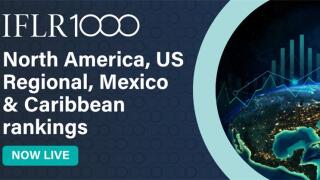Latin America and Caribbean
Future Abu Dhabi head Gonçalo Capela Godinho explains why Pérez-Llorca is exporting its Iberian expertise to Abu Dhabi
Award-winning finance lawyer Tatiana Guazzelli shares insights on fintech innovation, compliance, and long-term stability
New CARF rules increase compliance demands for crypto service providers, reshaping market transparency and strategy
Sustainability-linked and transition loans provide practical pathways for decarbonisation in emerging markets’ hard-to-abate sectors
New hires and promotions were made across finance, PE and M&A practices in London, Singapore, New York and Santiago
The firm has appointed dispute resolution partner Ian Mann to lead its new outfit in Dubai’s International Financial Centre
New hires and promotions were made across the PE, corporate, M&A, finance and capital markets practices in Frankfurt, Munich, London, New York and São Paulo
Why sponsors are turning to holdco PIK to boost leverage and preserve cash amid Latin America’s volatility
Sponsored
Sponsored
-
Sponsored by Consortium LegalEver since the Republic of Nicaragua became a member of the Financial Action Task Force of Latin America (GAFILAT), Nicaragua has experienced a gradual, yet impactful, overhaul in its provisions regarding prevention, detection and criminalisation of activities involving money laundering and financing of terrorism.
-
Sponsored by Brigard UrrutiaOn June 27 2019, the Institutional Limited Partners Association (ILPA) issued the third version of the private equity principles (principles). The principles continue to reiterate that the essence of an effective private equity partnership is built on the alignment of interests, governance and transparency; however, this third version also addresses new issues.
-
Sponsored by Alfaro Ferrer & RamírezSince Panama is a country with a territorial tax regime, it makes sense to have specific criteria to determine, on a case-by-case basis, if a person can be considered a Panamanian tax resident. A territorial tax regime implies that a taxpayer is only subject to the payment of taxes in Panama if its net monetary income has been obtained from commercial activity carried out within the Panamanian territory. Financial, legal and logistics services are among Panama's most robust economic drivers and these are attractive industries for foreign investment. This incoming foreign capital brings with it foreign individuals and corporate entities, which in turn leads to discussion on whether such foreign individuals and corporate entities should be considered Panamanian tax residents.






















